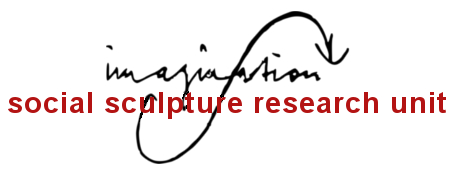Impulse and Conception
AN ‘EXPANDED CONCEPTION OF ART’ AND THE FIELD OF FREEDOM
The field of social sculpture relates to all those understandings, philosophies and practices that regard human beings as self-determining ‘freedom beings’ and not as slaves of destiny, genetic mechanisms, or cogs in a social machine.
This in turn implies that we are response-able and that we have work to do. And it emphasises that social sculpture involves shaping coherent and enlivened ways of being in the world that do not thoughtlessly exploit and damage all life forms.
In the early 1970s Joseph Beuys coined the phrase ‘social sculpture’ to describe ‘an expanded conception of art’ in which every human being – in their inherent creativity – is potentially an artist. By artist we can understand artist-sculptor of one’s own life, which includes one’s values, attitudes and ways of thinking, as well as the artist-sculptor of appropriate forms and conditions, in which every person has the opportunity to become this kind of social artist!
EXPLORING THE NATURE OF OUR FREEDOM
Given that we are certainly also shaped and affected by the conditions in which we live, where this freedom lies, how it comes about and how it is realised, are key questions and explorations in the field of social sculpture. They are explored in our writing, exchanges, projects and actions.
But we can also get a sense of this freedom if we connect what is going on ‘out there’ and ‘in here’… if we connect the crises and challenges we face with the inner perspectives, values and habits that create them. This will confirm how non-material forces and forms – like values, attitudes and decisions – have shaped the world as it is.
In recognising this we also see that ‘another world is possible’, no matter how huge the tasks, and that we can and must become creative ecological citizens.
FREEDOM AND RESPONSIBILITY
All the different manifestations of social sculpture share a commitment to the exploration and practice of freedom. But they also recognise that we are not here alone: that social sculpture is not only about the freedom of the individual human being. There are billions of human beings as well as the other-than-human beings, often exploited and grossly undermined.
And so, an equally important aspect of social sculpture has to do with exploring the relationship of the individual to the collective, and of human beings to the other-than-human world. We need processes and forums to shape new forms of community that do not negate but depend on response-able individuals; we need new understandings of what ‘progress’ might mean to shape a non-exploitative relationship to the other life forms.
This impulse is clear in the projects mobilising for Direct Democracy, in the Basic Income movement and in arenas like Earth Forum or University of the Trees, for re-schooling the senses, and for re-thinking how we live in the world. All are informed by an understanding of the intimate and necessary connection between freedom and responsibility.
All are informed by an understanding of the role of imagination to mobilise us internally, and how essential this is if the necessary mass mobilisations of people are to take place: for direct democracy, for new economic forms, for 100% renewable energy and for education and cultural forms that engender insight, wellbeing, creative agency and care.

